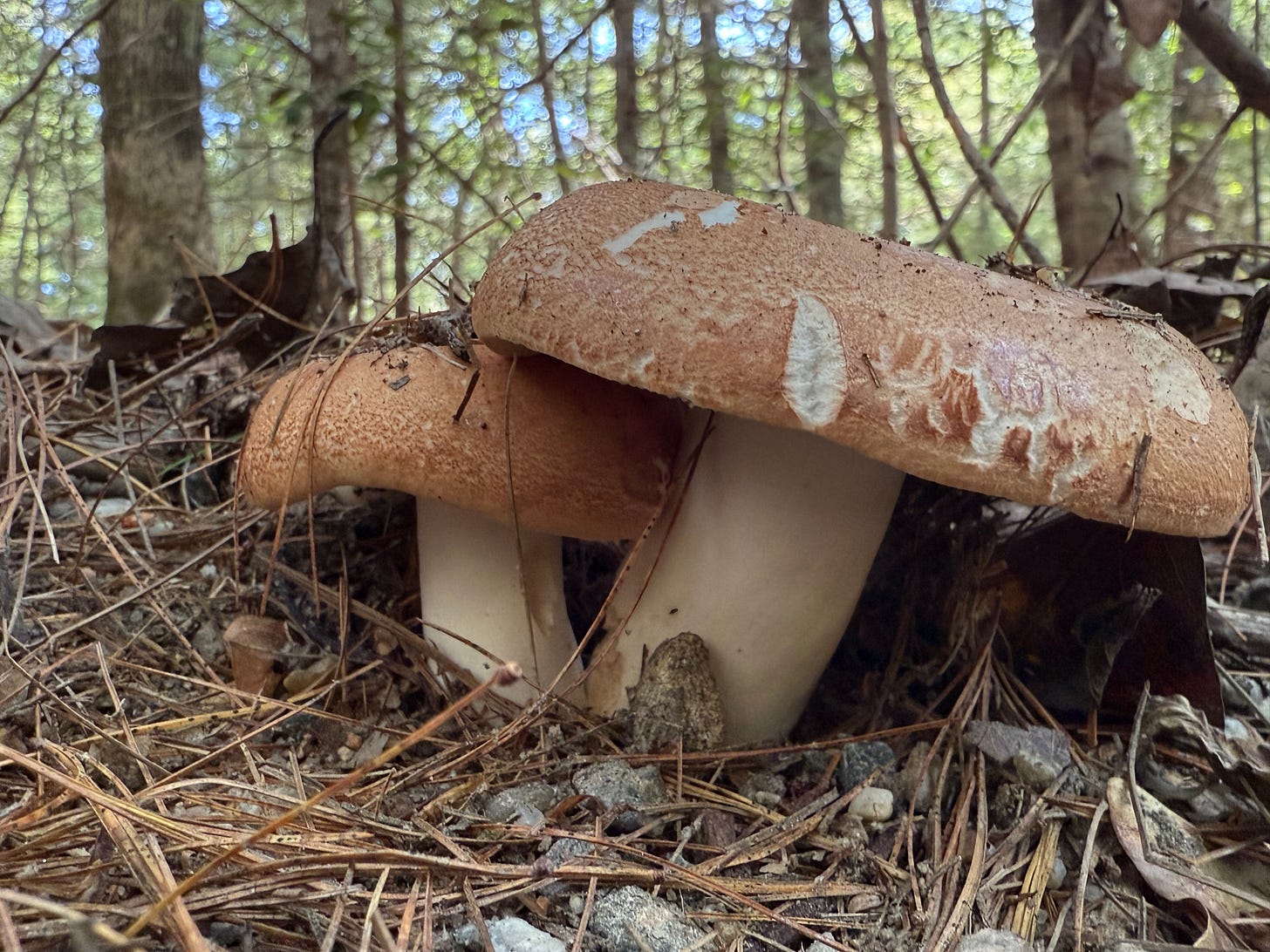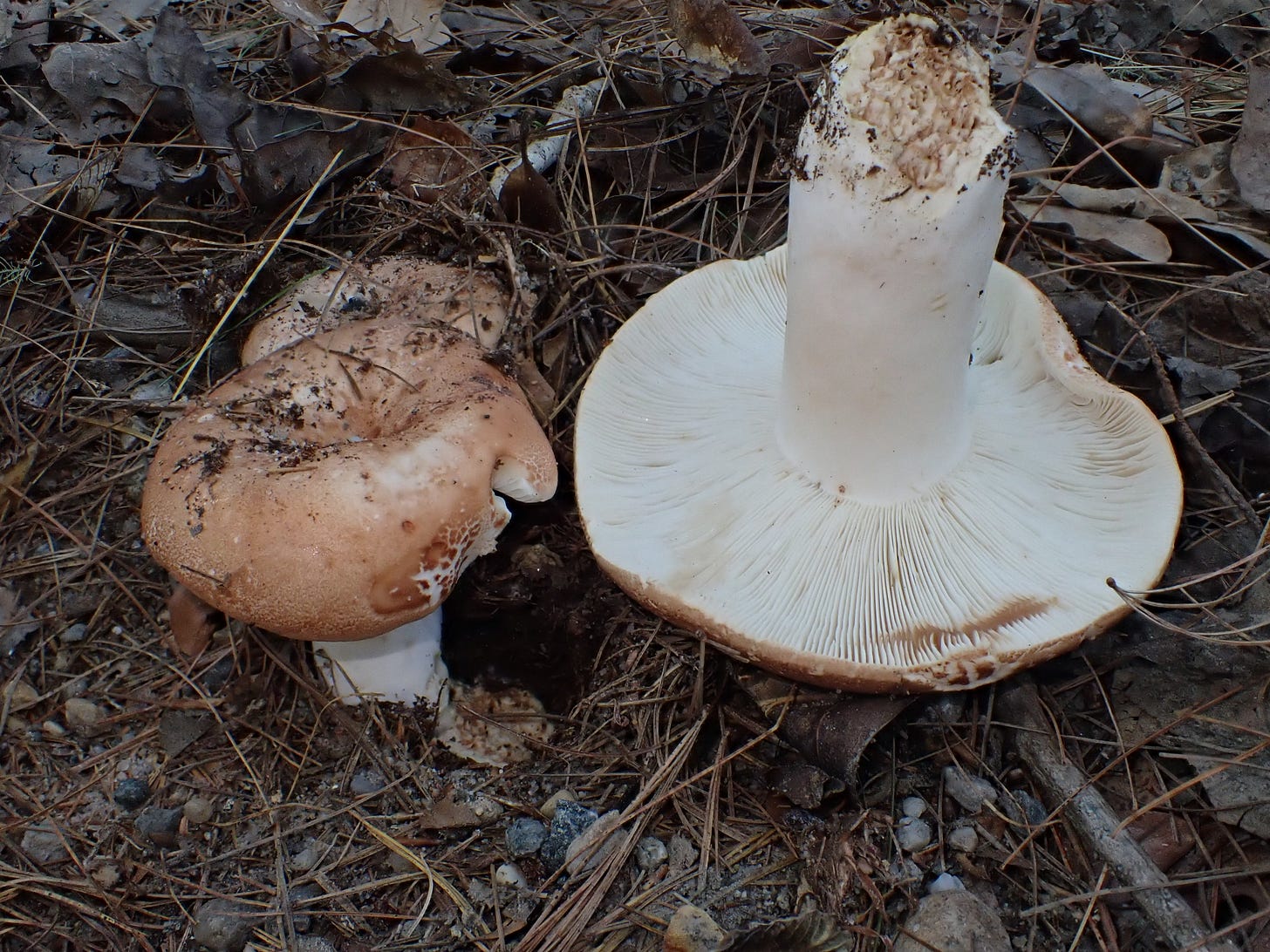Good morning, everyone,
How about that? A good morning? First time in a long time — I don’t quite remember the last time I sent out a Mushroom Monday so punctually on a Monday morning.
Well, the reason you’re reading this now is because I’m somewhere on the Northville-Placid trail, hiking and looking for mushrooms, and I pre-wrote this on Saturday. Everyone is frolicking around, enjoying their 4th of July weekend, and here I am typing away. That’s alright though, I was able to get my frolic in this morning when the Cape Cod Mycological Society met at the Lowell-Holly Reservation in Mashpee, MA.
There weren’t too many fleshy mushrooms out this morning and I learned that Cape Cod is the only region in Massachusetts that is still experiencing a significant drought after last year’s dry fall. While the mushrooms weren’t there in quantity, we did end up with a nice diversity of mycorrhizal mushrooms, and one in particular that stood out — perhaps for the wrong reasons — was the fishbiscuit brittlegill (Russula compacta complex).
Fun Facts
The peculiar common name refers to the unpleasant odor that emanates from the mushroom. While "fishbiscuit" definitely gives you an idea of the stench, the mycological term "spermatic" would also be appropriate. The taste was a touch bitter, and they definitely tasted how they smelled 🫤.
Another interesting feature of this mushroom is that the white gills bruise reddish brown — an uncommon characteristic for a Russula. In fact, apparently the entirety of the mushroom bruises. The cap is purported to start off nearly white, and the reddish brown you see below is a result of bruising after pushing through the leaf litter.
Etymology
Russula comes from the Latin russus which means “reddish” and refers to the typical red to purple coloring on the caps of mushrooms in this genus (like Russula mariae). The species epithet, compacta, comes from the Latin compactus and means "to compress" or "to make dense". This refers to the short, squat stature of the mushroom.

Ecology
This fungus grows mycorrhizally with oaks — a relationship where the tree sends sugars produced through photosynthesis down to the fungus in exchange for water and other nutrients the fungus sources from the soil. Specifically, Russula are ectomycorrhizal, so the fungus wraps around the tips of roots to establish this exchange, compared to some arbuscular mycorrhizal fungi that actually penetrate the cells of the root hairs to establish the exchange.
Russula are notoriously difficult to identify. Well, as Nathan put it today, they’re easy to get to genus but difficult to get to species. The unpleasant smell/taste, and the almond-colored cap, should place R. compacta in the foetid Russula group (a group of Russulas with the aforementioned characteristics), but surprisingly Michael Kuo doesn’t include this species in his key to North American Foetid Russulas.

The mushrooms are curiously found in eastern Asia (Taiwan, Japan, South Korea) and eastern North America (east of the Rockies) where they grow summer through fall. Russula compacta is technically a “subgenus” — a taxonomic category below genus but above species — and comprises a bunch of genetically distinct individuals that all look (and smell) similar. A few scientists deciphered some of the Korean fishbiscuits and split them into the species: Russula eccentrica, Russula nigricans, and Russula subnigricans.
Mushroom Forays and Festivals
8/14-8/17 Telluride Mushroom Festival in Telluride, CO
8/29-9/1 COMA Clark Rogerson Foray in Litchfield, CT
9/5-9/7 Friends of Fungi Foraging: Fall Retreat in Phoenicia, NY
9/18-9/21 NEMF Samuel Ristich Foray in Ithaca, NY
10/5 NYMS Fungus Festival on Randall’s Island, NYC
I’ll be back live next week with all of the mushrooms we found in the Adirondacks. Full moon on Thursday,
Aubrey
References:
Kuo, M. (2005, January). Russula compacta. Retrieved from the MushroomExpert.Com Web site: http://www.mushroomexpert.com/russula_compacta.html
Park MS, Lee H, Oh SY, Jung PE, Seok SJ, Fong JJ, Lim YW. Species delimitation of three species within the Russula subgenus Compacta in Korea: R. eccentrica, R. nigricans, and R. subnigricans. J Microbiol. 2014 Aug;52(8):631-8. doi: 10.1007/s12275-014-4168-z. Epub 2014 Jul 4. PMID: 24994012.






